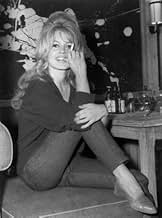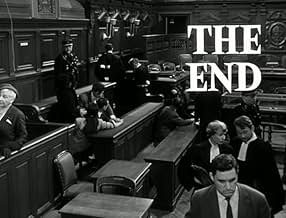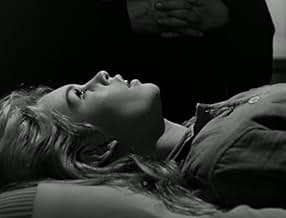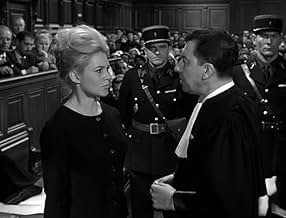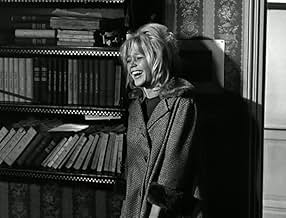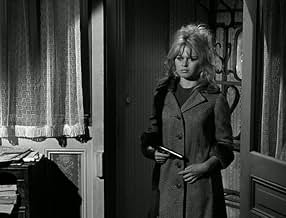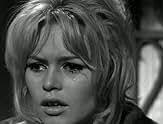Una chica, la oveja negra de la familia, se muda a París con su hermana. Tras la muerte de su joven amante, es acusada de asesinato, sin que esté claro si este fue un crimen pasional o preme... Leer todoUna chica, la oveja negra de la familia, se muda a París con su hermana. Tras la muerte de su joven amante, es acusada de asesinato, sin que esté claro si este fue un crimen pasional o premeditado.Una chica, la oveja negra de la familia, se muda a París con su hermana. Tras la muerte de su joven amante, es acusada de asesinato, sin que esté claro si este fue un crimen pasional o premeditado.
- Dirección
- Guión
- Reparto principal
- Nominado para 1 premio Óscar
- 3 premios y 2 nominaciones en total
- Daisy
- (as Barbara Sohmers)
Reseñas destacadas
M. Clouzot, although sounding a little like Insp. Clouseau wasn't particularly one for having a few laughs in his pictures. Although this is pretty much laden with wall to wall doom, there are some very human touches and sparks of humour which do make you smile - that makes this two hour plummet into the chasm of inevitable misery much more palatable. What also really makes this palatable and so utterly engaging is Miss Bardot - putting aside her brilliant performance - you could happily watch this whole thing with the sound off just gazing at this perfect young woman .....of course you'd need a good slapping if you did that because you'd be missing out on an extraordinarily realistic and moving acting performances. But such is the allure of this woman and such is the way this film has been crafted.
RUTH ELLIS? Like the sad and sadly true story of Ruth Ellis, the attitudes of the establishment as exemplified in this court are just the same as then. ....Gentleman of the jury, this young woman is not on trial for her shocking dissolute lifestyle or her immortality, she is on trial for murder..... This film's actual murder trial plays second fiddle to this film's real plot: clash of cultures. It's about the brutal conflict between two societies which until recently had hardly been aware of each other's existence. Like matter and anti-matter existing in the same space, although both inhabiting the same city, the established order - thinking of themselves, the pinnacle of civilisation had just discovered the existence of the working class youth.
PRE-CODE CIMEMA? You expect that class ridden sexism and almost laughable chauvinism in those movies from the early thirties. Ruth Chatterton in FEMALE, 1933 declaring that she's only a woman and should never have tried to do a man's job belongs in a distant age, almost a distant planet. This however is a generation later and because they now wear jeans and t shirts rather than evening dresses and top hats, it is sort of 'now' so when you see those antiquated prejudices, they're no longer amusing relics of a bygone age, they're about us so much more shocking.
Overall this is an intelligent and entertaining movie. It sits there in terms of style and quality with ANATOMY OF A MURDER, TWELVE ANGRY MEN and TO KILL A MOCKINGBIRD. It's also great to see Miss Bardot showing what a superb actress she was. Sami Frey is also very impressive as the love-struck young musician.
The man who worked this miracle ( turning Bardot into a first -class thespian) is none other than Henri-Georges Clouzot,one of the most daring clever gifted directors France has ever known.It was probably a hard time for him:he was about to become ill ,and that would prevent him from making another movie before 1968 ("the prisoner" ,his final achievement);besides the nouvelle vague on the rise dismissed Clouzot as a man of of the past,one of those creeps who "did not live what he was filming" (sic).Clouzot ,at his best, was better than 10 Chabrol ,20 Truffaut and 100 Godard ,but there's no accounting for tastes.Suffice to say that Clouzot,during his relatively short career (20 years ,and 11 films) ,took more chances single-handedly than the three artists mentioned above ,and his best works ("l'assassin habite au 21","le corbeau","quai des orfèvres","Manon","les diaboliques" -which got more praise abroad than in its native country- and "wages of fear" )are all classics.
"la vérité" is a long flashback ,a giant jig-saw the pieces of which will not completely put together at the end.The lovers of "les diaboliques" will appreciate the duel Paul Meurisse /Charles Vanel.They say HG Clouzot was very hard on his actors:but what a filmography!
In her memoirs ,BB wrote that it was HER favorite movie.
Indeed, the truth is that Henri-George Clouzot's film of the same name has been sentenced to decades of cinematic oblivion, 7 reviews on IMDb says enough. And the injustice is even more cruel because the movie stands alone as a masterpiece of the genre in a period full of gripping courtroom dramas such as "12 Angry Men", "Anatomy of a Murder", "Judgment at Nuremberg" or "Inherit the Wind" where the verdict mattered less than the quest for truth it initiated and the statements it spoke about the impact of human perceptions in the exercise of justice.
This is why the main question in "The Truth" is not 'who killed', not even 'how', but 'why?', the film takes place during the trial ensuing the murder of Gilbert Tellier, Sami Frey as a talented, handsome and ambitious conductor by his beautiful girlfriend, Dominique Marceau, who tried to kill herself right after. Dominique is played by a 25-year old Brigitte Bardot, in a breakthrough dramatic performance, that elevated her status to the most promising actress of her generation rather than a one-dimensional bimbo.
Yet Bardot's sex-appeal is still significant to the story as Clouzot intelligently exploits it to highlight the sulfurous past of a young idle girl who used her body as an asset, to live without working, without prostituting herself either. Indeed, Dominique Marceau isn't the typical slut: there is in her attitude something that nonchalantly confines to pathos, embodying the unease of the 60's youth, being in her own feminine and naughty way, a sort of rebel without a cause. And the intent of Clouzot is less to make a social commentary but to explore the different facets of a seemingly obvious personality.
The trial becomes the setting for a gripping character study, revisiting the life of Dominique Marceau before the killing from the perspective of two different counselors, played by two giants. Paul Meurisse denounces Dominique's laziness, the jealousy she always felt toward her more studious sister Annie, and a bunch of former lovers come to belie her faithfulness and love for Tellier, whom she murdered by vengeance, because she couldn't stand his relationship with Annie. As for her suicidal attempts, there were calculated acts since she was always sure someone would come at time to save her.
On the other side, Dominique's lawyer, played by Charles Vanel, tends to demonstrate that the murder was a passioned crime, an act of desperation from a tormented woman, as Dominique truly loved Gilbert and couldn't imagine life without him. One of the film's greatest delights is the verbal duel between the two actors, and their interactions that remind some of the great courtroom dramas, when two respectable adults, even friends, become visceral enemies during the trial, James Stewart and George C. Scott, Spencer Tracy and Frederic March or more recently, Tom Cruise and Kevin Bacon.
The interest of the Meurisse/Vanel antagonism is to keep a shadow of mystery around Bardot's real personality, a villainous killer or a woman victim of her passion. And as the story progresses, Dominique's portrait, originally painted in black and white reveals many shades of gray while her victim, the good-hearted Tellier becomes less and less innocent. The story opens in Paris where Bardot embodies the youth's ennui, living like a sort of social parasite whose only excuse is to use her body as thin consolation. Yet, she can't be a slut because she's totally unaware of conventions, she's beyond them, and doesn't even feel guilty.
Naturally, the inevitable happens, Tellier, Annie's friend falls in love with the sensual provincial girl. It's the typical love at first sight, but it's handled in a very talented way by Clouzot who's a real craftsman when it comes to human emotions. Hefirst meets Dominique when she's lying naked, topless in her bed, swinging her beautiful behind to some mambo music, she incarnates the luscious fruit, she's everything her sister is not, that's what makes her so obsessively desirable. Then the romance between Marceau and Tellier turns into a series of passion, deception, treachery and arguments like only a director like Clouzot could have painted without falling in a sentimental or either Manichean trap.
And as we get closer to the murder, we understand the roots of Dominique's behavior and her suicidal attempts carry deepest significances, rather than an act of despair, they crystallize the vulnerability of a girl that tries to find her place in society, torn between the true love of Gilbert and a sort of paradoxical innocence that raises above her lust. It feels strange but when you keep an eye on Bardot's performance, you'd think twice before calling a girl, a slut. Bardot was the perfect choice for the role and her breakdown transcends the sensual contours of her delicious body and can touch any soul.
After watching the film, I guess the reason of its lack of notoriety is the fact that H-G Clouzot is renowned for several masterpieces of the thriller genre, blending it with elements of horror, mystery or police procedural, therefore, a movie like "The Truth" comes too late in his filmography and doesn't meet the same recognition than the acclaimed "The Crow", "Quai des Orfèvres", not to mention the classic "Wages of Fear" and"Diaboliques". But on its own, it's a magnificent exploration of the human soul, a masterfully written courtroom drama, and still a Clouzot's film with its dark and pessimistic undertones, and the eternal cloud of ambiguity that envelops the character's personalities.
Bardot lived a romance with Frey after the film, and she was so affected by the experience that like her character, she tries to commit suicide, if a film haunted its own actors, it gives you an idea about the psychological impact it might have on you
"La Verite" narrates the trial of the breathtakingly-beautiful-sexy lost girl Dominique (Brigitte Bardot), for the murder of her former boy-friend Gilbert (Samy Frey). Everybody (Dominique herself, her former friends and various lovers, her enemies, notably her own sister, as well as lawyers and prosecutors) states his own version of the facts, but what is the actual truth? To simplify the question: is Dominique just a ruthless killer, or was she a weak, enamored girl, victim of Gilbert's selfishness and bullying? As always in Clouzot's movies, "La Verite" is extremely intense, packed with a profound and uncompromising psychological study. The almost obsessive pace of events gives no break to both the characters and the audience. The script is first-rate, with plenty of cynical sense of humor, in spite of the dramatic facts told.
Brigitte Bardot was a great actress, endowed with an outstanding talent. A careful viewer could easily get it even from BB's performances in minor movies, like, say "Mademoiselle Pigalle". Here, under the sound direction of a genius like Clouzot, she is just sensational in a highly dramatic role. Of course, also the acting by the remainder of the cast is excellent, especially, needless to say, by the legends Charles Vanel and Paul Meurisse, as the two lawyers.
Possibly, the main credit of this fantastic movie lies in a gelid, sarcastic, misanthropic representation of human society. Arguably, this is the trade-mark of Clouzot's style, together with suspense, which here is present but not exasperated like in his other works. The world of the adults is wholly despicable, permeated as they are with hypocrisy, with prejudice and fear, especially in sexual matters, and with sickening cynicism, as masterly represented by the lawyer Paul Meurisse.
However, the youngsters are no better than the adults. They are just fatuous, selfish, conceited loafers, only able to utter pseudo-intellectual chats. As a matter of fact, when Dominique founds herself in dire straits, none of her young friends moves a finger to help her. And Dominique often appears even worse than the others. From some point of view, she might be considered a totally negative character.
So, what's the point of Clouzot? I think that's not an issue. He just shows what he sees; that's the style and the aim of one of the greatest artists in the history of cinema.
"La Verite" is a total masterpiece. It is impossible to be disappointed. Highly recommended.
¿Sabías que...?
- CuriosidadesDirector Henri George Clouzot pushed his actors and actresses so hard - Sami Frey and Jacques Perrin were about to hit him in the face - that Brigitte Bardot tried to commit suicide after the shooting. She was too much implicated, involved in the Dominique character. She also said that this movie was the only one in her career which she was really proud of.
- Citas
The Prosecuting Attorney: You spent weeks seducing him, didn't you? Weeks!
Dominique's Attorney: Objection! What length of time should she have spent? Is there any legal limit on how long a seduction ought to take?
- ConexionesFeatured in The Art of Arts TV: The Single Arts Film (2008)
- Banda sonoraL'Oiseau de Feu
Written by Igor Stravinsky
Selecciones populares
- How long is The Truth?Con tecnología de Alexa
Detalles
- Fecha de lanzamiento
- Países de origen
- Idioma
- Títulos en diferentes países
- The Truth
- Localizaciones del rodaje
- Rue Saint-Antoine, Paris 4, París, Francia(Dominique hit by a bus)
- Empresas productoras
- Ver más compañías en los créditos en IMDbPro
- Duración2 horas 8 minutos
- Color
- Relación de aspecto
- 1.66 : 1

